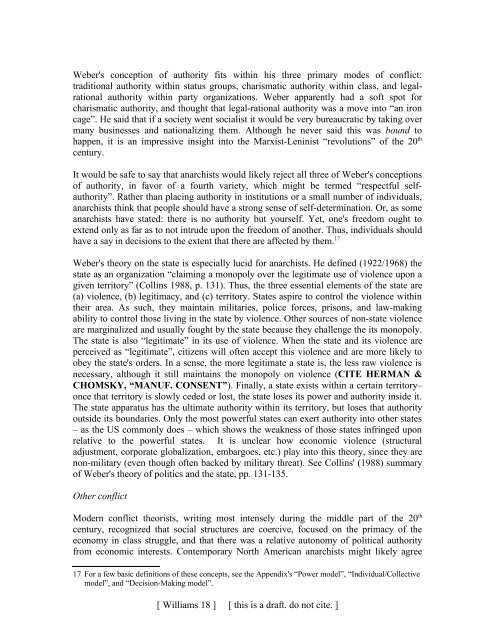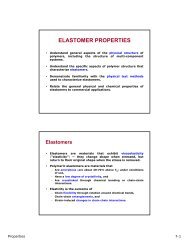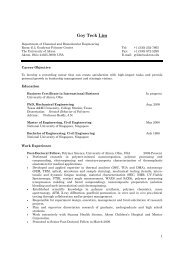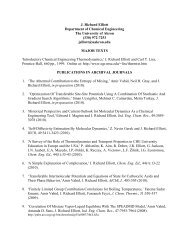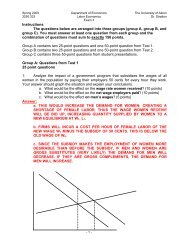Sociology of the Anarchists - Gozips.uakron.edu - The University of ...
Sociology of the Anarchists - Gozips.uakron.edu - The University of ...
Sociology of the Anarchists - Gozips.uakron.edu - The University of ...
You also want an ePaper? Increase the reach of your titles
YUMPU automatically turns print PDFs into web optimized ePapers that Google loves.
Weber's conception <strong>of</strong> authority fits within his three primary modes <strong>of</strong> conflict:<br />
traditional authority within status groups, charismatic authority within class, and legalrational<br />
authority within party organizations. Weber apparently had a s<strong>of</strong>t spot for<br />
charismatic authority, and thought that legal-rational authority was a move into “an iron<br />
cage”. He said that if a society went socialist it would be very bureaucratic by taking over<br />
many businesses and nationalizing <strong>the</strong>m. Although he never said this was bound to<br />
happen, it is an impressive insight into <strong>the</strong> Marxist-Leninist “revolutions” <strong>of</strong> <strong>the</strong> 20 th<br />
century.<br />
It would be safe to say that anarchists would likely reject all three <strong>of</strong> Weber's conceptions<br />
<strong>of</strong> authority, in favor <strong>of</strong> a fourth variety, which might be termed “respectful selfauthority”.<br />
Ra<strong>the</strong>r than placing authority in institutions or a small number <strong>of</strong> individuals,<br />
anarchists think that people should have a strong sense <strong>of</strong> self-determination. Or, as some<br />
anarchists have stated: <strong>the</strong>re is no authority but yourself. Yet, one's freedom ought to<br />
extend only as far as to not intrude upon <strong>the</strong> freedom <strong>of</strong> ano<strong>the</strong>r. Thus, individuals should<br />
have a say in decisions to <strong>the</strong> extent that <strong>the</strong>re are affected by <strong>the</strong>m. 17<br />
Weber's <strong>the</strong>ory on <strong>the</strong> state is especially lucid for anarchists. He defined (1922/1968) <strong>the</strong><br />
state as an organization “claiming a monopoly over <strong>the</strong> legitimate use <strong>of</strong> violence upon a<br />
given territory” (Collins 1988, p. 131). Thus, <strong>the</strong> three essential elements <strong>of</strong> <strong>the</strong> state are<br />
(a) violence, (b) legitimacy, and (c) territory. States aspire to control <strong>the</strong> violence within<br />
<strong>the</strong>ir area. As such, <strong>the</strong>y maintain militaries, police forces, prisons, and law-making<br />
ability to control those living in <strong>the</strong> state by violence. O<strong>the</strong>r sources <strong>of</strong> non-state violence<br />
are marginalized and usually fought by <strong>the</strong> state because <strong>the</strong>y challenge <strong>the</strong> its monopoly.<br />
<strong>The</strong> state is also “legitimate” in its use <strong>of</strong> violence. When <strong>the</strong> state and its violence are<br />
perceived as “legitimate”, citizens will <strong>of</strong>ten accept this violence and are more likely to<br />
obey <strong>the</strong> state's orders. In a sense, <strong>the</strong> more legitimate a state is, <strong>the</strong> less raw violence is<br />
necessary, although it still maintains <strong>the</strong> monopoly on violence (CITE HERMAN &<br />
CHOMSKY, “MANUF. CONSENT”). Finally, a state exists within a certain territory–<br />
once that territory is slowly ceded or lost, <strong>the</strong> state loses its power and authority inside it.<br />
<strong>The</strong> state apparatus has <strong>the</strong> ultimate authority within its territory, but loses that authority<br />
outside its boundaries. Only <strong>the</strong> most powerful states can exert authority into o<strong>the</strong>r states<br />
– as <strong>the</strong> US commonly does – which shows <strong>the</strong> weakness <strong>of</strong> those states infringed upon<br />
relative to <strong>the</strong> powerful states. It is unclear how economic violence (structural<br />
adjustment, corporate globalization, embargoes, etc.) play into this <strong>the</strong>ory, since <strong>the</strong>y are<br />
non-military (even though <strong>of</strong>ten backed by military threat). See Collins' (1988) summary<br />
<strong>of</strong> Weber's <strong>the</strong>ory <strong>of</strong> politics and <strong>the</strong> state, pp. 131-135.<br />
O<strong>the</strong>r conflict<br />
Modern conflict <strong>the</strong>orists, writing most intensely during <strong>the</strong> middle part <strong>of</strong> <strong>the</strong> 20 th<br />
century, recognized that social structures are coercive, focused on <strong>the</strong> primacy <strong>of</strong> <strong>the</strong><br />
economy in class struggle, and that <strong>the</strong>re was a relative autonomy <strong>of</strong> political authority<br />
from economic interests. Contemporary North American anarchists might likely agree<br />
17 For a few basic definitions <strong>of</strong> <strong>the</strong>se concepts, see <strong>the</strong> Appendix's “Power model”, “Individual/Collective<br />
model”, and “Decision-Making model”.<br />
[ Williams 18 ] [ this is a draft. do not cite. ]


